
by Maman Aya (USA) | Mar 14, 2014 | 2014, Awareness, Communication, Education, Kids, Milestones, Motherhood, Parenting, Preschool, Special Needs, USA, World Motherhood, Younger Children
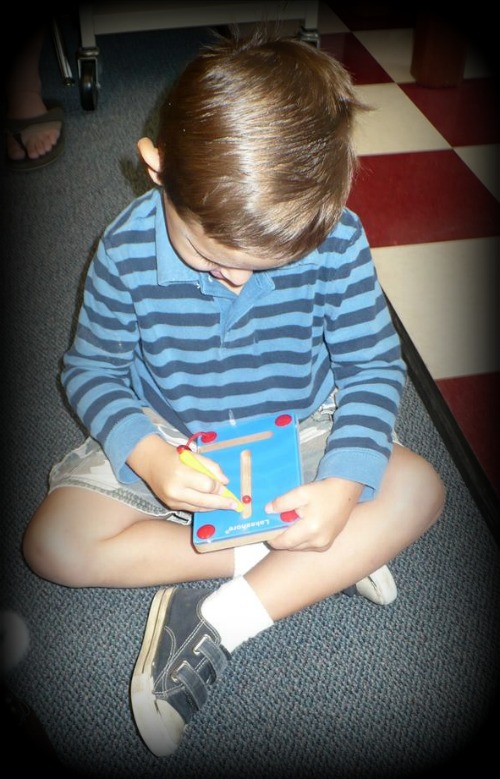 My son is eight months old and clearly utters his first word, and quickly starts to add more words into his daily speech and quickly starts to put them together to form ‘sentences’…in multiple languages! At 9 months old I start to potty train him, and he understands what I am trying to teach him.
My son is eight months old and clearly utters his first word, and quickly starts to add more words into his daily speech and quickly starts to put them together to form ‘sentences’…in multiple languages! At 9 months old I start to potty train him, and he understands what I am trying to teach him.
‘This child is brilliant’, all the adults in his life agree.
My son is about a year and a half. He goes to play at a nearby kids gym which has an area to climb and slide, a Lego area, an area to jump, balls, puzzles, magnets and blocks, etc. So many fun things for a toddler to do. Most kids are so excited. They run in and start playing with all of the toys. But not my son. He walks in and stands off to the side to observe the other children and watch what they do. To understand what is expected, I suppose. Once he understands what the other kids are all doing and how he is expected to behave and play with them, he joins the fun – and he has a blast – never wanting to leave.
When he is 18 months – 3 years old he takes ‘mommy and me’ classes on subjects he enjoys, like construction, art, French, music and cooking. He is tentative and does not participate straight away. It takes some time for him to warm up and I (or my mother, who is his daytime caretaker while I am at work) have to do most of the activity for him until about 10 minutes before the end of the 40 minute classes, week after week.
He is almost 3 and has started ‘school’, a few times a week, 3 hours at a time. The teachers comment that he would rather talk with them (and his vocabulary is amazing for a 3 year old – he started talking at 8 months after all), than play with his friends. He watches his friends and directs them (tells them if they are breaking a rule, or shows them how to do something), but does not easily go and play with them. He is more like one of the teachers than one of the 2 or 3 year-olds. I also notice that he doesn’t recognize, or confuses his letters (like mixing M and W), like other 3 year-olds.
This trend continues, although he does get better at socializing. He does get better at playing with other children, but only because he mimics their actions (good or bad). He doesn’t realize when an action is” not good”, because someone else did it before him, so it must be okay.
At 4 years old he starts having tics. His pediatrician tells me it’s normal for boys, there is nothing wrong with him. I take him to an eye doctor (one of his tics involves rolling his eyes), and he does need glasses, but the opthalmologist tells me that the tics are normal. I take him to a neurologist, who tells me nothing is wrong with him. Over the years I continue to express my concerns to the pediatrician. We realize that the tics are caused when he is stressed or excited.
“Nothing wrong,” says the doctor. This is not very reassuring.
I speak to his teachers over the years who assure me he is incredibly bright. He is mature. His vocabulary and speech are well ahead of his age, yes he is still mixing up letters, but the teachers assure me that it is within a normal range. He is indeed a very special child, teacher after teacher says.
But all of the reassurances in the world do not stop me from thinking that my son is different.
I watch to see if the other kids shun him…. they don’t seem to, but he is not choosing the friends that I would like him to have. That is to say, the nicer, gentler boys. I am afraid that he may be choosing the rowdier friends because he is over compensating. He is trying to fit in.
Fast forward to this past September. He started first grade as a normal 6 year-old. He was given a reading assessment (as were all of his classmates) and no red flags. About two months into the school year his teacher noticed that he was not doing as well as she would like, so she had him assessed even further. This time there were warnings. He is having problems reading (which I had asked his teachers about previously). He starts to spend one-on-one time with the reading specialist in his school and he has been making some progress, but there is some concern. I mention to the reading specialist that personally, I believe he may be dyslexic. She agrees that he does in fact have a “reading disability” (apparently dyslexia falls under that category these days), but that she is not qualified to be able to properly diagnose him.
That conversation was a few weeks ago. I feel relieved and worried. We have to keep working the system visiting specialist after specialist until I get an actual diagnosis. I don’t want to frighten him by taking him to see these specialists, but I do want to get an understanding of what I should do. And once I get a diagnosis, what should I do with it? How can this affect the rest of his learning, his education, and ultimately his life? What if the other kids make fun of him or shun him? How is this the same child who scored in the 90th + percentile on his kindergarten entrance exam on vocabulary, conversation and comprehension? (Yes they actually administer this test in NYC.) What if we decide to move, and have to change his school…will he have the help he needs to succeed? I have so many unanswered questions, and feel overwhelmed and not sure where to start…
Does you child have a learning disability? How did you find out? How have you helped your child learn to cope?
This is an original post to World Moms Blog by Maman Aya and was inspired by fellow WMB contributor Sophie Walker’s post, The Book I Never Thought I would Write.
Photo credit to Lesley Show. This photo has a creative commons attribute license.

Maman Aya is a full-time working mother of 2 beautiful children, a son who is 6 and a daughter who is two. She is raising her children in the high-pressure city of New York within a bilingual and multi-religious home.
Aya was born in Canada to a French mother who then swiftly whisked her away to NYC, where she grew up and spent most of her life. She was raised following Jewish traditions and married an Irish Catholic American who doesn’t speak any other language (which did not go over too well with her mother), but who is learning French through his children. Aya enjoys her job but feels “mommy guilt” while at work. She is lucky to have the flexibility to work from home on Thursdays and recently decided to change her schedule to have “mommy Fridays”, but still feels torn about her time away from her babies. Maman Aya is not a writer by any stretch of the imagination, but has been drawn in by the mothers who write for World Moms Blog. She looks forward to joining the team and trying her hand at writing!
More Posts

by Sophie Walker (UK) | Dec 11, 2013 | 2013, Autism, Being Thankful, Childhood, Divorce, Education, Friendship, Girls, Inspirational, Kids, Life Balance, Life Lesson, Me-Time, Older Children, Parenting, Relationships, Running, School, Sophie Walker, Special Needs, Stress, UK, Womanhood, Working Mother, World Motherhood, Writing
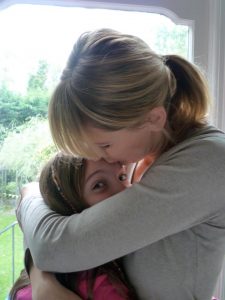 When I was a little girl, I wanted to be a writer.
When I was a little girl, I wanted to be a writer.
My bookshelves were bursting with myths and legends, tales of epic journeys and magical enchantments and warriors and warlocks and princesses; talking animals and terrifying villains. I read many of them over and over and would always think, when I closed the covers, how wonderful the author must have felt to have created such a thing.
I started writing my own stories, on sheets of rough paper, taped or stapled together. I would write the title first, then the author – me – beneath, then carefully index the chapters, number the pages and sometimes, if feeling really enthusiastic about the content, provide rave reviews for the back. I showed my parents, my friends, my teachers. People nodded and smiled.
I grew up, and kept writing. I studied English and French literature, and kept writing. I studied journalism, and kept writing. I got a proper job, and kept writing. Then I had a daughter, and stopped for a while. When I came back to it, I wrote furiously for several months, then realised the embarrassingly semi-autobiographical nature of the novel I had crafted, and put it aside. I got married, and got divorced, and had another child, and got married again.
There wasn’t very much time for writing, let alone for cudgeling my exhausted brain into thinking of something interesting to say.
Then my elder daughter Grace was diagnosed with Asperger’s Syndrome. It had taken us years to find out what it was that was ‘off’ – what the teachers saw, and wondered about, and what her peers saw, and walked away from, and what I saw, and thought was just my eccentrically lovable child. Finding out that my daughter had autism was like discovering she had been living behind glass for 8 years and that I had been oblivious to the sound of her banging her fists on it.
We were sent off with a label, and little support. Grace started to be bullied at school as she grew older and her differences became more apparent and other children were drawn to her weirdness and capacity for combustion when they pressed her buttons. They found all her buttons.
Grace spent a lot of time crying. I spent a lot of time crying. We both felt very alone.
Then one day on the way to work, I pulled out my notebook and emptied the thoughts in my head onto the pale blue lines. I scribbled and scribbled, oblivious to the other commuters, thinking that if I wrote everything down then I might be able to make sense of it. I came home and said to Grace: “Shall we write about what’s happening to us?” And Grace said: “Yes. Please tell them what it’s like.”
So I wrote. I wrote a blog and called it Grace Under Pressure. I wrote about how it feels to be the parent of a child with autism. I wrote about the things I was learning and about how much I realised I still had to learn. I wrote about Grace’s marathon attempts to fit in and understand her own limitations and learn to cope with the limitations of classmates who had no sympathy or understanding. I wrote about running a marathon myself in order to raise awareness among those who had no sympathy or understanding of autism.
People started reading the blog. Then more people read it, and more. Eventually, someone said: “You know, you should really think about making this into a book.” A publisher called Little, Brown agreed.
My book is not the book I ever thought I would write. But it is the kind of book that I used to read. It is the tale of an epic journey, and a magical enchantment, and a courageous princess. I am very proud of the princess, and I am grateful to her every day for letting me tell her story and for taking me with her on the adventure that changed our lives.
Grace Under Pressure: A Girl with Asperger’s and her Marathon Mom, by Sophie Walker, is published in the United States by New World Library, and in the UK by Little, Brown (Piatkus).
**Enter to win a free copy of Grace Under Pressure! Comment on this post for a chance to win — we will be choosing a winner on Friday, December 13th! **
This is an original post by our writer in the UK, Sophie Walker.
The image in this post is credited to the author.

Writer, mother, runner: Sophie works for an international news agency and has written about economics, politics, trade, war, diplomacy and finance from datelines as diverse as Paris, Washington, Hong Kong, Kabul, Baghdad and Islamabad. She now lives in London with her husband, two daughters and two step-sons.
Sophie's elder daughter Grace was diagnosed with Asperger Syndrome several years ago. Grace is a bright, artistic girl who nonetheless struggles to fit into a world she often finds hard to understand. Sophie and Grace have come across great kindness but more often been shocked by how little people know and understand about autism and by how difficult it is to get Grace the help she needs.
Sophie writes about Grace’s daily challenges, and those of the grueling training regimes she sets herself to run long-distance events in order to raise awareness and funds for Britain’s National Autistic Society so that Grace and children like her can blossom. Her book "Grace Under Pressure: Going The Distance as an Asperger's Mum" was published by Little, Brown (Piatkus) in 2012. Her blog is called Grace Under Pressure.
More Posts

by specialneedmom2 | Nov 1, 2013 | Being Thankful, Canada, Family, Health, Husband, Kids, Life Lesson, Moving, Parenting, Special Needs, World Motherhood, Younger Children
 Parents watch their child grow and exclaim that ‘Time flies!’ Or, on those endless afternoons where the cranky and over tired toddler simply will not nap, time drags on for an eternity.
Parents watch their child grow and exclaim that ‘Time flies!’ Or, on those endless afternoons where the cranky and over tired toddler simply will not nap, time drags on for an eternity.
As former residents of a major city and newcomers to Smalltown, Ontario, we’re adjusting to a different type of time – time without traffic.
Oh sure, we have traffic. Cars, trucks and boats (on trailers) go up and down the streets. And a friend told me about parents of kids at a school in the next town over picking up their kids on snowmobiles, but it’s a different kind of traffic than the choking gridlock that paralyses the Greater Toronto Area on a daily basis.
Our family is adjusting to life without traffic and on a more reasonable timeline, which only highlights how ridiculous our city life was. Two working parents with two kids in two different daycare facilities meant that we had to leave our home by 6:20 am every weekday to make the prerequisite drops just before squeaking into work just on time.
This meant the kids had to be up by 5:30 am to eat breakfast and stumble into clothes for the day. The birds weren’t even up! No wonder my oldest had serious behaviour issues – poor guy was exhausted.
Now as our family has grown to three children ages 6 and under, we’ve streamlined our efforts. One parent stays home, the other goes to work. Oh, and the oldest still has to be at school shortly after 8:00 am. Adding two children with special needs – with different therapist appointments and medical visits, and you have one busy family with serious time management issues. We’d have to drive for about 45 minutes (one way) to make those medical appointments (which were in the same city as we were; only traffic slowed you down to a crawl). So our family got used to leaving to go anywhere about an hour early.
Life in Smalltown, Ontario sure is different. If I drove for 45 minutes here I’d be in another township (or two)! Hubby and I find we do more in less time, and actually enjoy our drive through the town’s streets. A recent major shopping trip (one of those big box adventures, that required you to pick up stuff at other stores because it’s on sale) found Hubby and I sitting down for lunch with our toddler, wondering what to do with the rest of the day. We’d done a month’s worth of shopping in less than three hours, and been at three different stores too!
This is in sharp contrast to our city life, where lunch is a slice of pizza gobbled by kids strapped in car seats as a parent races to the next appointment or errand, all in an effort to save time. I’m not even going to talk about quality of life here. Check out my post, the Busy, Busy Month of May for more on this one. But back to time.
My daily commute is a perfect example of how time creeps away. Last year, for the first time in ten years my commute was under 20 minutes – without traffic. For ten years I’d been driving for an hour or more to work, and an hour or more from work. Around two hours each day, spent in my car. For ten years.
It makes me sick thinking about how much time was wasted, sitting and waiting for the car in front of me to move. Never mind the delays of an accident or construction – even my little 20 minute commute would balloon to over an hour if there was construction. (Which, as GTA residents will tell you, is nearly constant in summer time.) So as a family that has dealt with time-sucking gridlock, we love the freedom and new found time life in Smalltown brings. The kids are happy, parents are happy, we’re all relaxed and so much less stressed.
Some of the things we’ve been doing include:
- Spending time outdoors: Playing in the backyard kiddie pool after school! Playing in the backyard BEFORE school (unheard of!) Enjoying the fresh air and sunshine, instead of watching videos constantly. In the winter we’ll be outside playing in the snow.
- Visiting local Farmer’s Markets, Pow Wows and festivals.
- Becoming active in the community – the library, museum, YMCA and Sports Complex and Ontario Early Years Centre are only a short walk away.
I just signed up the oldest for Boy Scouts (Beavers, actually for his age group) and my daughter for dance classes – all on weeknights, and all only a short drive or walk away. I wouldn’t even dream of this in the city. We’re doing more, with less.
In short, we’re living life, on our own time.
What do you do to save time or make the best use of your time in your day?
Angela blogs about her super-powered, special needs family at halfpastnormal. They’re recently moved from Toronto, Canada to a small town in Ontario.
Toronto traffic jam photo credit to James D. Schwartz. This photo has a creative commons attribute license.
Angela is a Special Education teacher who blogs about her super-powered special needs family. She has a 3 year old with Prader-Willi Syndrome and a 5 year old with Duchenne Muscular Dystrophy and Sensory Processing Disorder. The odds of these random genetic events occurring at the same time are astronomical. "When you add our typically developing one year old baby boy to the mix, you have a very busy household!", she explains.
Angela admits to having too many appointments, too many school problems, and being generally too busy as she tries to live life to the fullest. Please visit her family at Half Past Normal for more of their adventures! If you want to connect to chat, you can find her on Twitter @specialneedmom2
If you are interested in Special Education policies and procedures in Ontario – or just some excellent strategies and accommodations – please check out Angela's other site at Special Ed on the Bell Curve.
More Posts
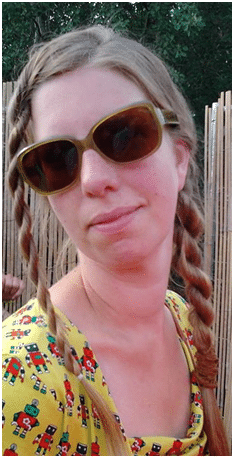
by Katinka | Oct 21, 2013 | Adoptive Parents, Being Thankful, Belgium, Birth Parents, Childhood, Cultural Differences, Domesticity, Family, International, Interviews, Kids, Penguin and Panther, Relationships, Siblings, Special Needs, Uncategorized, Working Mother, World Moms Blog Writer Interview, Writing, Younger Children
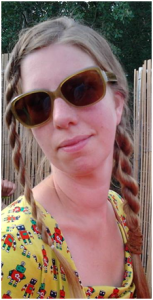 Where in the world do you live? And, are you from there?
Where in the world do you live? And, are you from there?
I was born, raised and proudly remain stuck in the Belgian mud. I would sometimes dream about moving abroad, but it turns out I’m quite happy staying right here. I do like to travel several times a year, mostly for work.
What language(s) do you speak?
My mother tongue is Flemish (which is basically the same as Dutch), but with Belgium being a trilingual country, I also speak French and I can understand German. Obviously, I also speak – and write – English. About ten years ago I also decided to learn Indonesian, but all I remember of it now are the words kamar kecil, which means I can actually ask where the bathroom is if I would make it to Indonesia one day.
In addition, I would love to learn how to read and write music, and to understand Amharic, the first language of our daughter.
When did you first become a mother?
This is a tricky one, because in my experience, I can call on two firsts. Two totally different ways of expecting a child, of becoming a mother, both wonderful and intense. In 2006, I first became a mother when our son was born, the one I love to call our cuddly Penguin. Five years later, in 2011, I first became an adoptive mother when we brought our two-year-old daughter home, our darling Panther.
Is your work, stay-at-home mom, other work at home or do you work outside the home?
Apart from being a full time mom, full time housekeeper and full time wannabe writer, I also have a full time job outside my home. Some might even say I’m building an exciting career as a geomicrobiologist, enabling me to go on missions abroad and to research amazing subjects, but they should know that my favorite moments are without doubt coming home, be it after a working day or a business trip.
Why do you blog/write?
I started blogging (in Flemish) during our adoption procedure, merely as a way to keep friends and relatives posted on any news we would get in those long years. Along the way, blogging became a kind of therapy, enabling me to vent frustrations and personal struggles, or to focus on optimism and fun facts. I also learned just how much I loved to write.
I kept on blogging until our daughter was home for two years. I recently decided to stop, mostly for the privacy of my children and because I felt like I was getting ‘addicted’ to blogging. It was a hard decision, disappointing to quite some readers who liked the plain honesty in my writing. But, as a go-between, I decided to start a low frequency, anonymous, English blog about life with my Penguin and Panther, and to contribute to WMB every once in a while. And in the extra spare time I have now, my newest endeavor is to write children’s books, which has long been a dream of mine.
How would you say that you are different from other mothers?
As a typically modest Belgian, I truly find it awkward to differentiate myself that way. I don’t believe I have something special about me as a mother, or a person for one. But since I have to, well, I guess I would be different from other mothers because my kids come in two opposite colors and with some extra needs. Our blond haired Penguin is an overly sensitive philosopher who understands more than is good for him, while our curly Ethiopian Panther deals with attachment, anxiety and health issues. They leave me both exhausted and enriched every single evening, but I guess that’s no difference to other mothers…
What do you view as the challenges of raising a child in today’s world?
I don’t even know where to begin! Every day is a challenge, when raising children, isn’t it? One of my major concerns though, is to let our children remain children as long as possible. I strive to keep a delicate balance between guarding my children innocence and purity, and still teaching them about the need for respect and care for the less fortunate or for our struggling environment. With today’s society going so fast, having everything within reach, leaving nothing to the imagination, I try to create an island of simplicity and ‘slowness’ for our children (and ourselves!) at home, where they can develop at their own pace. But when time comes, I still want them to be able to catch one of society’s speed boats that are racing by our island…
How did you find World Moms Blog?
I just bumped upon WMB through a cartoon someone shared. I think. My kids often beat me at ‘Memory’, so I can’t be sure about it. But I do remember I started reading and reading and couldn’t stop for another hour.
This is an original interview of our new writer in Belgium, K10K – pronounce it as Ka-ten-ka and you will come quite close to her real name – from The Penguin and The Panther
The image used in this post is credited to the author.
If you ask her about her daytime job, Katinka will tell you all about the challenge of studying the fate of radioactive substances in the deep subsurface. Her most demanding and rewarding job however is raising four kids together with five other parents, each with their own quirks, wishes and (dis)abilities. As parenting and especially co-parenting involves a lot of letting go, she finds herself singing the theme song to Frozen over and over again, even when the kids are not even there...
More Posts

by World Moms Blog | Sep 16, 2013 | 2013, Adoption, Adoptive Parents, Africa, Being Thankful, Cultural Differences, Discipline, Ethiopia, Family, Guest Post, Health, Humanity, Humor, Inspirational, International, Kids, Motherhood, Multicultural, Netherlands, Parenting, Special Needs, Uncategorized, World Motherhood, Younger Children
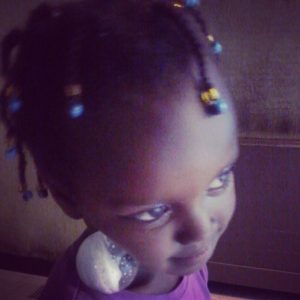 Sometimes I’m really weary of explaining. To grannies in the supermarket. To teenage girls at the playground. To fellow mums at school.
Sometimes I’m really weary of explaining. To grannies in the supermarket. To teenage girls at the playground. To fellow mums at school.
My daughter is clearly adopted, yes. She’s from Ethiopia, yes. She’s had a rough start, yes. She’s lost part of her eyesight, yes. And she’s got some countless more issues, yes.
But she’s still a four year old. And I’m her mother. I’m raising her my way. Just like I’m raising her big brother, who is blond and looks a bit too much like me.
The big difference between raising my daughter and raising my son, is that people seem to feel a kind of responsibility towards my girl. It feels like adopted children are in a way public.
I do understand how we stand out, in our not so worldly little town. We are getting used to the extra attention she brings with her, although I admit I have been thinking to teach her to growl when a stranger touches her hair and skin unasked.
We were prepared for all this. We knew we were going to feel like we have arrows flashing around our heads when taking her out. Now that she’s been with us for two years, we’ve all grown a thick skin, filled with humor. We have a series of catchy replies to go with all the ridiculous questions. The next one who dares to ask me what we feed her, will be answered ‘grass’, without even a blink.
But I still can’t really cope with all the unwanted ‘advice’ we get about raising her. When my son was little, I never ever had some stranger giving him candy or cookies. I never had to explain myself in the supermarket when I refused to let him take everything he wished for. And I certainly didn’t have to listen to people telling me how neglectful I was for letting him cry out a tantrum.
With my daughter, I do have those encounters. This one time in the supermarket, I was truly abashed. I had just taken away some nasty sugar bombs from my daughter’s hands and put them back, much against the little miss’s wishes. An elderly lady came over, took the candy and handed them over to my girl again. I was confused, believing she misunderstood. So I explained I didn’t want to buy that rubbish for her. At that moment she cursed me for being so horrible towards that poor little black girl that has been hungry all her life. She put the candy in my cart, ordered me to buy it, and took off while nodding her head.
At such encounters – yes, plural – I have the urge to scream.
For one thing. She’s NOT a poor little girl. She’s in most ways an ordinary four year old preschooler. She can throw the worst tantrums I ever witnessed, just because I can’t peel an apple while driving my car or because I can’t make the Easter bunny magically appear in August. The last one was about having only six colors of nail polish to choose from. Poor girl indeed.
But most importantly, I’M THE ONE raising that ‘poor little girl’. Of course we are aware of her issues, mostly the ones regarding attachment and anxieties. We try to give her everything she needs, truck loads of patience and care which unfortunately aren’t always replenished in time. But she doesn’t need everything she wants. Just like any other child doesn’t. Unless you plan to end up with a spoiled brat that demands a yellow sports car at age eighteen.
Spoiling her will not make right all the things she missed out in the first two years of her life. Maybe that sounds harsh and loveless, but I can assure you it isn’t meant that way. I cry with her when she mourns her lost heritage, when she is homesick. I’ve swallowed away rivers of tears all those times I had to explain her history to medical doctors and hospital professors.
But I can’t raise my daughter based on pity alone.
This is a first-time, guest contribution to World Moms Blog from our friend and mother of The Penguin and the Panther in Belgium, Katinka. Her Flemish blog is in transition over to an English-only blog. Stay posted to World Moms Blog for more from Katinka.
The photograph of the author’s daughter used in this post is credited to the author.
World Moms Blog is an award winning website which writes from over 30 countries on the topics of motherhood, culture, human rights and social good. Over 70 international contributors share their stories from around the globe, bonded by the common thread of motherhood and wanting a better world for their children.
World Moms Blog was listed by Forbes Woman as one of the "Best 100 Websites for Women 2012 & 2013" and also called a "must read" by the NY Times Motherlode in 2013. Our Senior Editor in India, Purnima Ramakrishnan, was awarded the BlogHer International Activist Award in 2013.
More Posts

by Mama Mzungu (Kenya) | Aug 28, 2013 | 2013, Cultural Differences, Education, Inspirational, Kenya, Kids, School, Special Needs, Uncategorized, World Motherhood
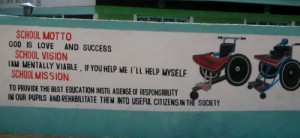 In the US, people with physical disabilities focus on fighting stigma, on being viewed as people who can do almost anything despite of their physical limitations, and on fighting for the world to make appropriate accommodations in order to even the playing field.
In the US, people with physical disabilities focus on fighting stigma, on being viewed as people who can do almost anything despite of their physical limitations, and on fighting for the world to make appropriate accommodations in order to even the playing field.
In Kenya, like so many low-income countries, people with physical disabilities, children in particular, are fighting for their very survival.
A friend, who runs a school for the disabled here, recently told me an illustrative story. The man who founded the school was visiting a friend in a rural area and came across a disabled child who was tied to a tree while his parents went to work in the field. The boy was left with a bowl of food and forced to defecate in the radius rope permitted. The school founder, touched by this scene, made it his life’s work to make lives better and futures brighter for these children. (more…)
Originally from Chicago, Kim has dabbled in world travel through her 20s and is finally realizing her dream of living and working in Western Kenya with her husband and two small boys, Caleb and Emmet. She writes about tension of looking at what the family left in the US and feeling like they live a relatively simple life, and then looking at their neighbors and feeling embarrassed by their riches. She writes about clumsily navigating the inevitable cultural differences and learning every day that we share more than we don’t. Come visit her at Mama Mzungu.
More Posts - Website
Follow Me:


 My son is eight months old and clearly utters his first word, and quickly starts to add more words into his daily speech and quickly starts to put them together to form ‘sentences’…in multiple languages! At 9 months old I start to potty train him, and he understands what I am trying to teach him.
My son is eight months old and clearly utters his first word, and quickly starts to add more words into his daily speech and quickly starts to put them together to form ‘sentences’…in multiple languages! At 9 months old I start to potty train him, and he understands what I am trying to teach him.



 Parents watch their child grow and exclaim that ‘Time flies!’ Or, on those endless afternoons where the cranky and over tired toddler simply will not nap, time drags on for an eternity.
Parents watch their child grow and exclaim that ‘Time flies!’ Or, on those endless afternoons where the cranky and over tired toddler simply will not nap, time drags on for an eternity.









